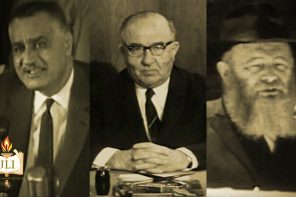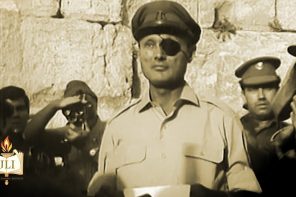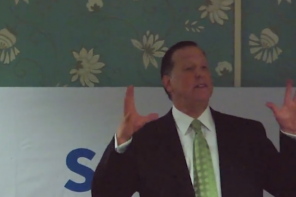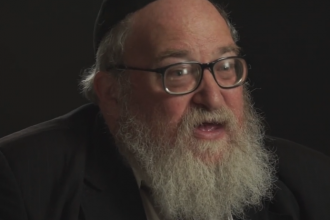…Through Exodus Israel entered the popular American imagination as a romantic screen legend. Both the cinematic and novelistic portraits of Israel gave Americans, Jewish and Gentile, a hero to root for and to identify with: the plucky little Jewish state fighting for its freedom against overwhelming odds… In uncanny fashion newspaper headlines appear to follow a Hollywood script. First comes three weeks of increasingly unendurable tension: removal of U.N. peacekeeping troops, sealing the Straits of Tiran, mobilizing of Egyptian and Syrian forces on the border, massing of tanks and planes poised for invasion, inflammatory threats of destruction by Arab leaders, cautious diplomacy by Western nations. By the beginning of June, Israel stands completely alone—as a Hollywood hero should stand—against the massed military might of the whole Arab world. Then, in six brilliant, tension-filled days, the Israeli military not only single-handedly fights off the Arab armies of Egypt, Syria, and Jordan, but reunites Jerusalem, recaptures the Sinai, and triples the territory of the state. In the Six-Day War, Israel lives up to its screen legend. Image and reality fuse: heroic visions become living history. This representation of Jewish David as a hero of westerns helps to account for America’s sympathy for Israel during the war…
Steadfast courage infuses a portrait by New York Times columnist James Reston. “These people have gone to war with remarkable calm and kindliness to one another,” he wrote on the first day of the war. “There is a curious combination of sadness and determination in their manner.” Describing the “ancient Biblical roads” as transformed by war, Reston portrays the Israeli army as “a singing army, not polished but rumpled as if it had been in battle for months, not all young but all mixed up with young and middle-aged waving to the youngsters at the side of the road and smoking and singing like Hemingway’s heroes at the start of the Spanish Civil War.” Theodore White, writing in Life, took a more sober view. Perhaps as a Jew he identified with the Israeli soldiers he describes because he explicitly links them to their past history of persecution and destruction as well as to an almost miraculous will to live. He defined “Israelis as Jews who have declared that they will not ever again be victims—and their army is an expression of this will.” According to White, “the army expresses the fundamental politics of survival. As such, it unifies a people who will not die.”
Where, amid all these images of secular Jewish heroes, are the religious men? Although few and far between, representations of religious Jews appear most often in conjunction with the reuniting of Jerusalem. Newsweek’s photos of the war by Charles Harbutt include steel-helmeted Israeli soldiers as well as one soldier in Tallit and Tefillin, praying. Terence Smith’s front page New York Times account focuses on Israeli troops weeping and praying at the Western Wall. “The Israelis, trembling with emotion, bowed vigorously from the waist as they chanted psalms in a lusty chorus. Most had submachine guns slung over their shoulders and several held bazookas as they prayed,” he wrote. Photographers captured Rabbi Shlomo Goren carried on the shoulders of Israeli paratroopers as he blows the shofar beside the Western Wall. The caption beneath reads: “Victory trumpet: Israeli troops at the Wailing Wall.” Describing the same scene, UPI reported that “a bearded rabbi in a paratrooper’s uniform blasted a call of triumph on the shofar. An officer wearing a skullcap hoisted a blue and white Israeli flag on a pole atop the Wailing Wall.” Rejoicing in their victory, the Israelis shouted “Jerusalem is ours!” and then hugged and kissed each other. “The they prayed. It took three days to regain what the Jews lost more than 2,000 years ago,” the UPI reporter observed. Life’s photo series includes a close-up of Goren at the wall, one hand holding a small prayer book and the other captured in rapid motion. These images all submerge the religious in the military. In one of the few accounts of religious civilians, Newsweek’s reporter, himself Jewish, describes the “scene of wild joy” when he returned with Israeli soldiers through the Mandelbaum Gate to Jewish Jerusalem. “Hundreds of orthodox Jews, wearing the traditional caftans (long black coats), their long sideburns flying, waving Torahs, clamored to get to the Wailing Wall. One of them stopped me and asked me in Yiddish if I had touched the wall. When I said yes, he grabbed my hands and kissed them and the longing overpowered him and he wept. ‘I am out of my mind,’ he cried.”
Deborah Dash Moore, “From David to Goliath: American Representations of Jews Around the Six-Day War,” in The Six-Day War and World Jewry, Eli Lederhendler, ed., pp. 73-74, 76-77
——
“Has the Six-Day War produced a change in my weltanschauung?” mused Elie Wiesel in early 1968. “I would go even further and say that the change was total, for it involved my very being as both a person and as a Jew.” The celebrated writer echoed a consensus among American Jews that they had reacted to the previous year’s events in perfect accordance with their historical obligations and to the betterment of Jewish existence. “To destroy [Israel],” he continued, “to let it be destroyed, would have meant the end of an affirmation, the end of hope, the end of our history which we shaped as both Jews and human beings . . . [T]he end of Israel would mean to me the end of man.” But Israel had not perished, and American Jews felt strengthened, if still baffled, by their role in its victory. “[W]hatever happened last year represents for me-and I hope for you as well,” Wiesel concluded, “a moment in which each gesture became an elan, an opening toward pride and humility and, above all, astonishment. For me, then, the problem is not how to explain it, but rather how to capture it, how to keep it alive, and make it mine.”
ZEITZ, JOSHUA MICHAEL. “”If I Am Not for Myself… “: The American Jewish Establishment in the Aftermath of the Six Day War.” American Jewish History 88, no. 2 (2000): 253-86. http://www.jstor.org/stable/23886261.
——
I believe the Six-Day War and the fact of Israel play an essential role in the “at-homeness” of American Jews. By this I mean that any thinking Jew, even a man or woman who knows very little of Jewish texts or life, cannot fail to recognize that he or she was born in a century in which millions of people tried to eradicate the Jews and millions of Jews were unprotected from that fate. I have seen in even my most assimilated friends, who are marrying non-Jews without much of a qualm, an awareness of Jewish vulnerability that is, I think, unconsciously offset by the existence of the Jewish state. I would go further and say that we carry our heads high in America not only because the country has been home to us in an unprecedented way but because there is a country across the sea that is not home but homeland. For writers like me, for whom Jewish texts and a Jewish way of reading are defining, Israel is a living engagement, a country whose people, national life, literature and language—and myth—are at the vital core of my idea of myself, writer and Jew.
Nessa Rapoport, “Jewish Cultural Confidence in American Letters: A Writer’s Thoughts,” in The Six-Day War and World Jewry, Eli Lederhendler, ed., p. 122
——
While conducting research on American students participating in a study program in Israel in 1966-1967, the researcher was afforded the opportunity of observing the effects of the Six-Day War on the group. While the war clearly had an impact on Diaspora Jewry generally, its impact was even more pronounced on these youths who found themselves within the war zone itself. Though their parents urged them to return home, not a single student left. In the crucible of experience, a deeper identification with Israelis and a greater readiness for aliyah was forged among the students.
Haim Arni and Jeffrey Mandl, “An Annotated Bibliography,” in The Six-Day War and World Jewry, Eli Lederhendler, ed., p. 320
——
This essay (Milton Himmelfarb, “In the Light of Israel’s Victory”) contends that the Six-Day War, by displaying Israel’s isolation in the world, reinforced among Jews a growing disillusionment with the modern, universalistic outlook they had once championed. Many rediscovered the depths of their particular Jewish commitments, both ethnic and religious, and turned to parochial Jewish concerns.
Haim Arni and Jeffrey Mandl, “An Annotated Bibliography,” in The Six-Day War and World Jewry, Eli Lederhendler, ed., p. 321
——
[According to Charles Silberman in A Certain People: American Jews and Their Lives,] the Six-Day War marked the beginning of a Jewish revival. The depth of American Jewry’s emotional involvement in Israel’s fate, intensified by fears the war would end in another Holocaust, awakened Jews to the importance of their Jewishness. Abandoning a dominantly universalistic outlook, many came to embrace and assert their religious and ethnic distinctiveness. Moreover, estranged from their former allies among the Christians and the Left, Jews developed independent political activism to further specifically Jewish interests.Haim Arni and Jeffrey Mandl, “An Annotated Bibliography,” in The Six-Day War and World Jewry, Eli Lederhendler, ed., p. 328
——
The Six Day War also marked for some “a turning point in American Jewish consciousness,” changing the way American Jews thought “not only about Israel but about themselves.” A volume of contemporary Jewish fiction, published in 1992, actually used 1967 to demarcate when the contemporary era for Amercan Jews began. With the war’s end, it explained, “Israel became the religion of American Jews, the transcendent object of their politics and philanthropy and pilgrimages and as such, a new source of loyalty and solidarity, and in time, of dogma and controversy.”
Jonathan Sarna, American Judaism, p. 316
——
The [1967] victory of the tiny Jewish state over the hosts of the Arab enemies sent a thrill through the hearts of the Jews in Russia, as it did, I suppose, for Jews all over the world. The feeling of deep anxiety for the fate of Israel with which Soviet Jewry followed the events was succeeded by boundless joy and overpowering pride in our people. Many, and especially the young, realized their Jewish identity for the first time… The anti-Israel campaign in the Soviet mass media served only to spread further Zionist feeling among the Jews.
Anatoly Dekatov in the Jerusalem Post, 1970 (cited in Sachar, Howard M., A History of Israel, p. 735)





